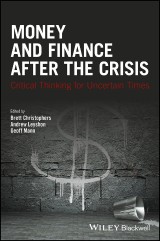Details

Money and Finance After the Crisis
Critical Thinking for Uncertain TimesAntipode Book Series 1. Aufl.
|
20,99 € |
|
| Verlag: | Wiley-Blackwell |
| Format: | |
| Veröffentl.: | 19.06.2017 |
| ISBN/EAN: | 9781119051404 |
| Sprache: | englisch |
| Anzahl Seiten: | 272 |
DRM-geschütztes eBook, Sie benötigen z.B. Adobe Digital Editions und eine Adobe ID zum Lesen.
Beschreibungen
<p><i>Money and Finance After the Crisis</i> provides a critical multi-disciplinary perspective on the post-crisis financial world in all its complexity, dynamism and unpredictability. Contributions illuminate the diversity of ways in which money and finance continue to shape global political economy and society.</p> <ul> <li>A multidisciplinary collection of essays that study the geographies of money and finance that have unfolded in the wake of the financial crisis</li> <li>Contributions discuss a wide range of contemporary social formations, including the complexities of modern debt-driven financial markets</li> <li>Chapters critically explore proliferating forms and spaces of financial power, from the realms of orthodox finance capital to biodiversity conservation</li> <li>Contributions demonstrate the centrality of money and finance to contemporary capitalism and its political and cultural economies</li> </ul>
<p>Series Editors’ Preface vii</p> <p>Notes on Contributors ix</p> <p>1 Money and Finance After the Crisis: Taking Critical Stock 1<br /><i>Brett Christophers, Andrew Leyshon and Geoff Mann</i></p> <p><b>Part I Financial Imaginaries 41</b></p> <p>2 From Time–Space Compression to Spatial Spreads: Situating Nationality in Global Financial Liquidity 43<br /><i>Dick Bryan, Michael Rafferty and Duncan Wigan</i></p> <p>3 Financial Flows: Spatial Imaginaries of Speculative Circulations 69<br /><i>Paul Langley</i></p> <p>4 Making Financial Instability Visible in Space as Well as Time: Towards a More Keynesian Geography 91<br /><i>Gary A. Dymski</i></p> <p><b>Part II Financial Practices 117</b></p> <p>5 Banks in the Frontline: Assembling Space/Time in Financial Warfare 119<br /><i>Marieke de Goede</i></p> <p>6 Undoing Apartheid? From Land Reform to Credit Reform in South Africa 145<br /><i>Deborah James</i></p> <p><b>Part III Financialization 169</b></p> <p>7 Infrastructure’s Contradictions: How Private Finance is Reshaping Cities 171<br /><i>Phillip O’Neill</i></p> <p>8 The Financialization of Nature Conservation? 191<br /><i>Jessica Dempsey</i></p> <p>9 Financialization of Singaporean Banks and the Production of Variegated Financial Capitalism 217<br /><i>Karen P.Y. Lai and Joseph A. Daniels</i></p> <p>Index 245</p>
<p><b> Brett Christophers</b> is Professor of Geography at Uppsala University. <p><b> Andrew Leyshon</b> is Professor of Economic Geography at the University of Nottingham. <p><b> Geoff Mann</b> is Professor of Geography and Director of the Centre for Global Political Economy at Simon Fraser University.
<p> 'The 2008 financial crisis was a long-tail event, not only in being rare but also in leaving behind a global trail of damage and disruption. <i>Money and Finance After the Crisis</i> provides an indispensable roadmap to the world we now inhabit. Challenging and provocative, it will launch many impassioned conversations.' <p><b> Mary Poovey,</b> <i>Professor of English, New York University, USA </i> <p> 'One of the few benefits of financialisation has been the spur given to interdisciplinary work on money and finance, with geography and sociology in the lead. This collection demonstrates the progress made by bringing together prominent scholars to discuss the aftermath of the crisis of 2007–9. It is a powerful book, handled with confidence by the editors, all authorities in the field.' <p><b> Costas Lapavitsas,</b><i> Professor of Economics, SOAS University of London, UK </i> <p><i> Money and Finance After the Crisis</i> provides a critical multidisciplinary and multiscalar perspective on the post-crisis world of finance in all its complexity, dynamism and unpredictability. The contributions illuminate the diversity of ways in which money and finance continue to shape global political economy and society. <p> Written in the wake of the Global Financial Crisis of 2007–2009, the chapters highlight the significance of thinking about money and finance geographically by following the trail of the crisis and its aftermath through distinctive and interlinked spaces, ranging across the global financial centres of New York and London, the surplus-generating economies of Asia and the Middle East, and the ordinary households whose labours underlie the investments, debts, and speculations of society's collective and individual fortunes. <p> From the realms of orthodox finance capital to biodiversity conservation, the chapters explore proliferating forms and spaces of financial power and a broad range of contemporary social formations, including the ways in which modern debt-driven financial markets shape and are shaped by, for example, the 'War on Terror', neoliberalizing China, and racialized inequality in post-Apartheid South Africa. Collectively, the contributions show there is neither a universal experience of the post-crisis world, nor a singular 'correct' analysis.
<p>‘The 2008 financial crisis was a long-tail event, not only in being rare but also in leaving behind a global trail of damage and disruption. <i>Money and Finance After the Crisis</i> provides an indispensable roadmap to the world we now inhabit. Challenging and provocative, it will launch many impassioned conversations.’<br /><b>Mary Poovey, Professor of English, New York University, USA</b></p> <p>‘One of the few benefits of financialisation has been the spur given to interdisciplinary work on money and finance, with geography and sociology in the lead. This collection demonstrates the progress made by bringing together prominent scholars to discuss the aftermath of the crisis of 2007-9. It is a powerful book, handled with confidence by the editors, all authorities in the field.’<br /><b>Costas Lapavitsas, Professor of Economics, SOAS University of London, UK</b></p>
Diese Produkte könnten Sie auch interessieren:

Observing Systems for Atmospheric Composition

von: Guido Visconti, Pietro Di Carlo, W. Brune, M. Schoeberl, Andreas Wahner

149,79 €















